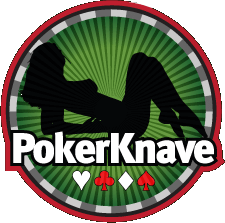
PokerKnave PokerKlub Tournament Rules
For all rules to the various games please follow link to Poker Rules on Wikipedia
However here is a brief summary of the rules for the tournament that Pokerknave tend to have for most games off Texas Hold Em:
1. There must be a tournament director/organiser and they will have the final decision.
2. The director will make sure that everyone is familiar with the rules of the game and the house rules
3. If there is a Buy-in then that must be made in good time
4. The director will fairly distribute the seating for all contestant
5. The director will determine start time, blinds increase and break times.
6. The director will be responsible for colouring up, reseating and prize money.
The Blinds and the Button:
The button is a disc placed in front of a player, and signifies who is the dealer for that hand.
The blinds are forced bets (so called because the players have to post them ‘blind’ before they see any cards) placed by the two players to the immediate left of the button. The first player posts the small blind and the second player posts the big blind. The small blind is generally half the number of chips of the big blind. After each hand the button progresses one place to the left, and so do both the blinds.


Pre-Flop Action (1):
Once a player has received their pocket cards (hole cards), they are faced with their first decision: to play or not to play. A player must decide if they are in or out of the hand, and do this by matching the bet that stands when the action reaches them (or indeed raising that amount if the feeling so takes them). Betting will go in sequence starting from the first player to the left of the dealer, and continue round the table sequentially in a clockwise fashion until all bets have been matched.
The possible actions available to any player are: Fold, Call or Raise.
As the action moves around the table pre-flop, players wishing to remain in the hand will have to at least call (match) the big blind bet, OR if a previous player has raised (increased the bet) then that bet will have to be at least called to remain in the hand. A player always has the option to fold any time the action is on them (it is their turn).
If there has been no raise when the action (betting round) returns to the big blind player, that player will still have the option to raise if they so desire. Any money put into the pot by a player before any cards are dealt counts as part of their overall bet. So if the blinds are 25 chips (sb) and 50 chips (bb) and there is no raise before the action gets to the small blind, then he or she will only have to put an extra 25 chips into the pot to match the 50 chips as they already have 25 invested prior to the dealing of the cards.
Once all bets are matched the flop is dealt.
The Flop (2):
The flop consists of three cards being dealt face up in the middle of the table. These are community cards, meaning that they are shared by all the players and may form part of anyone’s hand.
A round of betting will now follow, starting from the player to the immediate left of the button and continuing clockwise around the table.
Once again any player will have the option to Fold, Check, Call or Raise.
A check is a situation where there is currently no bet that stands which a player would have to match, so a player may decide to continue that by checking (essentially calling a bet of zero). Betting will continue as detailed above until all bets are matched. Once this happens the next card is dealt
The Turn (3):
The turn card (or fourth street) is dealt face up in the middle of the table and becomes another community card. A round of betting then ensues in the same fashion as detailed above. The players who remain after this round of betting will then see the final card.
The River (4):
The final card is the river (or fifth street); this is dealt face up in the middle of the table and is also a community card. Players now have all the cards they can. The idea is to make the best five-card poker hand from the seven available (the two pocket or hole cards and the five community cards).
The final round of betting now follows in the same fashion as previous rounds. Those players that still remain after the completion of the betting then go to the showdown.
The Showdown:
Once all betting has been completed the players who remain show their cards.
If there was betting on the last round then the player who made the last positive action (last player to make a bet – not to call one) will show first, if the last round of betting involved all players ‘checking’ then it will be the player to the immediate left of the button who will show first then clockwise from there.
In Texas Hold’em Poker a player may use any combination of their two hole cards and the five cards on the board (the community cards). A player may even simply ‘play the board’ and only use the community cards to form their hand (this differs from other forms of poker).
The player with the best five-card hand wins the pot. In the event of player’s hands being the same, the poker pot will be equally divided between the players. The rules of Texas Hold’em give no differentiation between suits so split pots can be common.
The button now moves clockwise to the next player and a new hand begins.
The following actions are improper, and grounds for warning, suspending, or barring a violator:
*Deliberately acting out of turn.
*Deliberately splashing chips into the pot.
*Agreeing to check a hand out when a third player is all-in.
*Reading a hand for another player at the showdown before it has been placed face up on the table.
*Telling anyone to turn a hand face up at the showdown.
*Revealing the contents of a live hand in a multihanded pot before the betting is complete.
*Needlessly stalling the action of a game.
*Deliberately discarding hands away from the muck.
*Cards should be released in a low line of flight, at a moderate rate of speed (not at the dealer’s hands or chip-rack).
*Stacking chips in a manner that interferes with dealing or viewing cards.
*Making statements or taking action that could unfairly influence the course of play, whether or not the offender is involved in the pot.
*Using a cell phone at the table.
Additional Rules for PokerKnave Turbo:
Pokerknave Turbo: After the seating has been sorted and the dealer selected, the big and little blinds are doubled after ever hand. This is to cull as many players as possible and to give the weaker players a chance to win some money.
Therefore if the first hands it is £50 little blind and £100 big blind, then the second hand will be £100 little blind and £200 big blind and so on and so on.
So it the blinds will be:
1st Hand 50/100
2nd Hand 100/200
3rd Hand 200/400
4th Hand 400/800
5th Hand 800/1600
6th Hand 1600/3200



